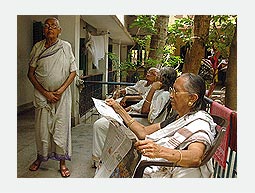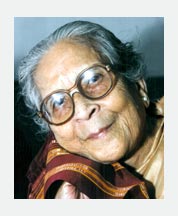|

|
Mahila
Seva Samity was born in 1947 to provide relief and rehabilitation
to women and children. When partition displaced thousands of
people from their homes who began pouring into the newly created
state of West Bengal in now independent India, the Chief Minister
at the time, Dr. P.C. Ghosh, asked individual citizens to step in
and help the victims of partition in any way possible. Answering
that call, a number of women's organizations joined hands to form
the West Bengal Emergency Relief Committee, which was later named
Mahila Seva Samity. Our home is located in the Rajpur-Sonarpur
area in 24 Paraganas district of West Bengal, outside Kolkata with
land donated by the Government of India. Over the years, these
buildings have provided shelter, food, rehabilitation, and
training to over 3000 women and children. Mahila Seva Samity is a
non-profit organization; all members of its Executive Committee
volunteer their time and services without financial renumeration.
The Samity is registered under the Foreign Contribution
(Regulation) Act, 1976, and all donations are exempt from Income
Tax under Section 80(G) of the Income Tax Act, 1961.
|
|

Smt. Ashoka Gupta, one of the founders of
Mahila Seva Samity was the daughter of Kiran Chandra Sen and
Jyotirmoyee Devi. She was educated at St Margaret’s School and
stood first among girls in her matriculation examination, after
which she joined Bethune College and graduated with Mathematics
honours. She married Shaibal Kumar Gupta, who was in the Indian
Civil Service.
She became a member of the All India Women’s
Conference in 1936 and took an active part in fund raising and
setting up of various welfare organizations and branches of the
AIWC. She coordinated the activities of voluntary organizations
during World War II after the bombing of Calcutta in 1942 and was
involved in relief work at Bankura during the Bengal famine of
1943. During the communal riots in Noakhali in 1946 she led a team
of volunteers on behalf of the All India Women’s Conference,
Chittagong branch, to bring relief to the uprooted humanity, and
encourage and comfort the panic stricken multitude, while at the
same time trying to restore communal harmony by appealing to
people’s basic humanity under the inspiring guidance of Mahtma
Gandhi.
Post partition, she shouldered the
responsibility of coordinating the efforts of various voluntary
organizations that focused on refugee rehabilitation, literacy of
dropout children and adults, and the welfare on tribal children
and rural women. She was the Chairperson of the West Bengal State
Social Welfare Advisory Board from 1955 to 1959 and a member of
the Central Social Welfare Board from 1959 to 1969 on the advice
of Smt. Durgabai Deshumukh and Dr. B.C. Roy, the Chief Minister of
West Bengal at the time. In 1964, in Mana and other Camps in
Dandakaranya she organized relief work under the guidance of Smt.
Aachamma Mathai, the Chairperson of the Central Social Welfare
Board at the time.
She served as State Commissioner (Guides) from
1956 to 1967 and State Chief Commissioner, Bharat Scouts and
Guides from 1968 to 1974. She was associated with the Calcutta
University as a Fellow of the senate for a term (1948 – 53),
served on the Executive Council of the Viswa-Bharati University
(1965-73) and was associated with Palli Sanghathan Vibhag of Viswa
Bharati from 1956. She was a member of the Standing Committee of
All India Women’s Conference Central Body, a Trustee of the
Kasturba Gandhi National Memorial Trust, a Patron of the Indian
Society for Sponsorship and Adoption, the President of S.O.S.
Children’s Village and the President of Mahila Seva Samity at the
time of her death in July, 2008.
She visited the UK, USA, USSR, Brazil, South
America, Japan, Italy, Austria and the Federal Republic of West
Germany to participate in various conferences and study
programmes. In 1992 she was invited to attend the U.N. Conference
of Literacy in New York where she presented a paper on the
progress of Literacy amongst women in India and the achievements
of the AIWC & AICEIW (All India Committee for Illiteracy amongst
Women); there she participated in a debate and workshop attended
by representatives of many Developing and Asian Countries.
Her publications include Noakhalir Durjoger
Diney ( The Dark Days of Noakhali) and numberous articles on
Gandhiji’s contribution to women’s development as well as general
articles on women’s issues from her perspective as an activist in
the field.
She was awarded the Jamnalal Bajaj award and D. Litt degree in
2007 in recognition of her lifetime of work with women and
children. The money from the awards was set aside for the various
welfare organisations she was associated with.
As recalled by a former colleague, “Strong feisty personalities
like her come seldom into our lives, and when they do, they make a
deep impression. She was one of a kind – they don’t make them like
her anymore!” |